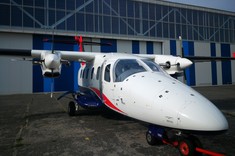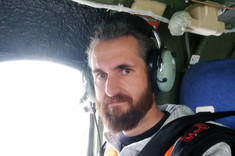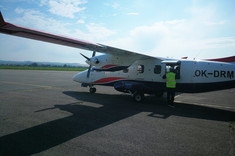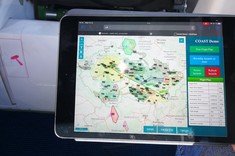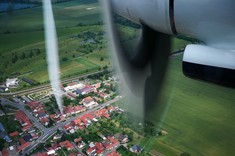In-flight demonstration of the Integrated Mission Management System
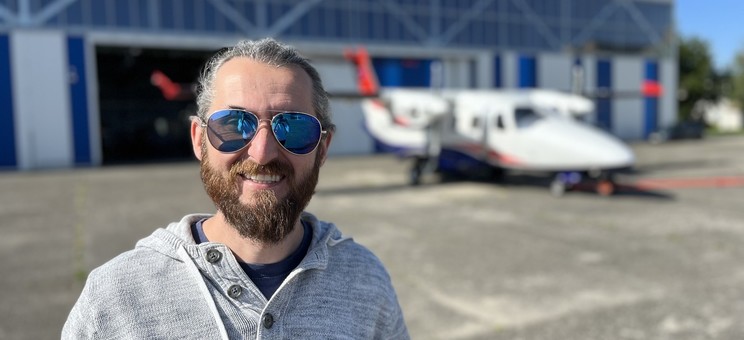
Flight tests and a demonstration of technologies being developed as part of the COAST project, part of the European Clean Aviation project co-financed from the European Union budget, took place in Kunovice, the Czech Republic. The task of the researchers from the Department of Avionics and Control Systems at the Faculty of Mechanical Engineering and Aeronautics, Piotr Grzybowski BEng, PhD, and Kamil Ziółkowski, BEng, MSc, was to develop a modern instrument in in collaboration with cooperating parties to facilitate flight planning, as well as to monitor the current course of the flight taking into account the risks involved.
Purpose of the study
The in-flight demonstration was designed to show that the developed instrument allows for real-time indication of problems in the execution of a flight plan, particularly from air traffic, changing weather conditions, terrain, and permitted air traffic areas. Among other things, functions related to facilitating route planning between airports and algorithms for automatic runway and landing strip selection were tested. During the flight, the device was also monitoring the planned route for the emergence of new hazards (unknown at the planning stage) and propose an alternate route in the event of their occurrence.
Course
In the course of research using the EV-55 aircraft, a product of the Czech company Evektor, the project manager on behalf of the Rzeszów University of Technology, Piotr Grzybowski, BEng, PhD, and Kamil Ziolkowski, BEng, MSc, conducted intensive tests of the software implementing the functions assumed for the system, which were implemented in a modern hardware platform developed by Honeywell Technology Solutions. This platform was integrated into the aircraft's onboard installations for the study.
The first day of testing made it possible to determine the correctness of the software, as well as to observe the pilots' reactions, record their interactions with the software interface and comments related to its operation and use.
June 13, 2023, turned out to be a lucky day, as after intensive work at Honeywell's headquarters in Brno, most of the remarks on the software-defined by the pilots the day before were implemented, and the correctness of the modifications made was confirmed using the portable Hardware-In-The-Loop workstation developed at Rzeszów University of Technology.
On the last day of testing, intensive preparations for the final demonstration of IMMS operation were underway from the early morning hours. After a briefing attended by Evektor representatives (including test pilots), engineers from Honeywell, and scientists from the Rzeszów University of Technology, the ground testing phase proceeded, confirming that flights could be safely performed. Due to the excellent weather, they moved immediately. In the first flight, it was confirmed that it was possible to monitor obstacles in real-time, depending on the aircraft's current position, and to improve situational awareness by modifying the display of hazards that affect the planned flight or pose a threat to the aircraft.
The second flight tested the feasibility of route planning using IMMS and ongoing weather monitoring utilizing the system. Interestingly, according to the project, one of the cooperators remotely supplied weather information to the aircraft - the Italian research center CIRA from Capua, nearly 1,000 kilometers from the test flight site. In particular, it was checked whether a change in weather conditions would affect the ability to carry out the planned flight, and if so, whether it was possible to reconfigure the flight in the event of risks unknown at the planning stage that could affect the safe execution of the flight operation.
The tests’ results came as no surprise, as the intensive preparations and the hundreds of hours spent developing and testing the system in the earlier stages of the project yielded the expected results, and the in-flight demonstration went off without a hitch. These tests represent the next step towards implementing so-called Single-Pilot-Operations in commercial aviation.
It is worth mentioning that the technologies developed in the previous phases of the COAST project, such as FRS (Flight Reconfiguration System that operates in case of pilot indisposition), AWAS (Advanced Weather Awareness System), CCP (Compact Computing Platform for CS-23 category aircraft applications) and TSS (Tactical Separation System), have been awarded by 2021 Technical Highlights within the Clean Aviation program.
COAST Project
The COAST (Cost Effective Avionic System) project focuses on developing critical technologies supporting low-cost cockpit equipment for disposition aircraft enabling single-pilot flights. The target segment is aircraft carrying up to 19 passengers, certified to CS-23 regulations. The project has been implemented since 2016 under the Clean Aviation program by a consortium consisting of Honeywell International (Czech Republic), CIRA - Italian Aerospace Research Center (Italy), Institute of Aviation - Łukasiewicz Research Network (Poland), and the Ignacy Łukasiewicz Rzeszów University of Technology (Poland).




